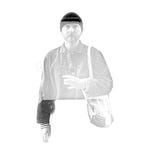Books On Film. A French Cinema Special.
With much of July having been dedicated to the French cinema (you can blame the Tour de France for that) I thought it apt to do a bit of a “further reading”-style guide. Here’s a handy round-up of some of our favourite books that cover the subject.
Tomes on the general history of French cinema. There are a number of often-recommended books that cover the wider history of the French national cinema. French Cinema: From Its Beginnings to the Present
by Rémi Fournier Lanzoni and The Faber Book of French Cinema
by Charles Drazin are both accessible volumes, which serve as solid introductions to the French film industry’s past, while the BFI’s The French Cinema Book
is a good anthology piece, edited by Michael Temple and Michael Witt. For my money, the best of the bunch though is the (relatively) little-known Republic of Images: History of French Filmmaking
, by Alan Williams. First published in 1992, Williams’ book covers the French cinema from the days of the belle époque through to the post French New Wave 1970s and 80s. Though not concerned with the history of French cinema in itself, Andre Bazin’s two-volume What is Cinema?
is as much a part of the fabric of that history as any film.
The New Wave. A History of the French New Wave Cinema
by Richard Neupert was recently updated to include a section on the Left Bank movement, which just about makes it the definitive long-read on the subject. Also worth seeking out is The French New Wave: Critical Landmarks
by Ginette Vincendeau and Peter Graham. Published by the BFI, it’s a handy compendium of key writings on and, most importantly, from the era. It includes integral essays such as Francois Truffaut’s A Certain Tendency In French Cinema and Andre Astruc’s A theory of caméra stylo, which were in many ways the first rally cries of the Nouvelle Vague itself. On a similar note, several volumes of excerpts from Cahiers du cinéma were published by Harvard Film Studies in the 1980s, and are valuable resources. As sheer enjoyment goes, few can beat James Monaco’s The New Wave
, which is probably the most readable book on the subject.
Godard. There are a number of great autobiographies on Godard. The veteran filmmaker’s life is charted in great detail in Richard Brody’s Everything is Cinema
, which stands as the most impressive, though Colin MacCabe’s A Portrait of the Artist at Seventy
, though not as ambitious as the Brody tome, is a good introduction to the man (and started life as an official biography, a rarity for Godard). For Ever Godard
, a mammoth coffee-table book edited by Michael Witt, Michael Temple and James Williams offers something a little different, with it a richly illustrated companion to the director’s extensive oeuvre. As we’ve mentioned a number of times recently, Godard’s later period has been undergoing something of a cultural reevalution of late with three significant volumes published in the last 10 months. Jerry White’s Two Bicycles
focusses specifically on the Anne-Marie Miéville collaborations, while Daniel Morgan’s Late Godard and the Possibilities of Cinema
takes a look at the period from the late-1980s onwards. Michael Witt’s recently published Cinema Historian
was the subject of a fuller piece on Hope Lies recently, and stands as a great overview of Godard’s thinking behind Histoire(s) du cinéma.
Truffaut. Antoine de Baecque’s biography of Francois Truffaut, simply titled Truffaut: A Biography
is the highlight of a solid line-up of books examining the life and work of the Jules et Jim director. Truffaut’s own book length interview with Alfred Hitchcock remains a landmark of the medium.
Assorted books on random filmmakers. So few books have been written on Jacques Rivette
, so what there is out there is to be grasped with both hands. Mary Wiles’s monograph on the filmmaker, published as part of the Contemporary Film Directors imprint from the University Of Illinois Press is the best I’ve ever come across. To Rivette’s contemporary, Eric Rohmer now, and The Cinema of Eric Rohmer: Irony, Imagination, and the Social World
is my favourite. Frustratingly Antoine de Baecque’s recent biography of Rohmer is thus far untranslated from its original French (as too does the same writer’s biography of Godard). Jean Renoir is well served by a pair of disparate volumes that complement one another perfectly. The director himself even opens his biography, My Life And My Films
, with a passage citing Andre Bazin’s book Jean Renoir
as the place to go to for more analytical notes, as he doesn’t for discussing that kind of thing himself! The Manchester University Press’s imprint on specific filmmakers is great too. Their volume on Maurice Pialat
is particularly worthwhile. Finally, and another mention for the great James Monaco, this time for his book on Alain Resnais
, which is all the more impressive and important in the wake of the death of the filmmaker.
